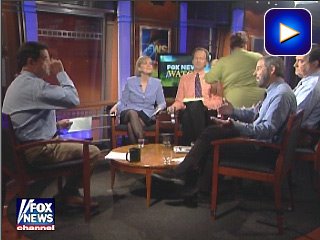
An interesting and perspective-rich discussion on Fox’s “News Watch” show on Saturday night, as host Eric Burns asked the four panelists about the impact of Fox News on the overall news business over the past 10 years.
Jim Pinkerton led off: “In the old days, pre-Fox, somebody like Walter Cronkite would turn to somebody like Eric Sevareid and say, ‘So, what do you think of Richard Nixon?’ And Sevareid would say, ‘He’s not very good.’ And Cronkite would say, ‘Thank you, that’s the news.’ That was administered news from the top. Fox introduced the idea of argument, and debate, and it’s changed the landscape of cable news.” Pinkerton is right: it was administered news, or preached news, from the church of liberalism. And yes, to paraphrase Walter Cronkite, “That was the way it was.”
Neal Gabler, a liberal who is generally no fan of Fox--and makes that distaste for FNC obvious every week, proving that FNC has a thick skin--rarely agrees with anything that Pinkerton says, but interestingly enough, agreed with at least some of Pinkerton's argument in this instance. Indeed, Gabler went further, adding that Fox’s impact was larger than just the cable world; Gabler argued that Fox had gotten “inside the heads” of the broadcast networks, too. That is, Fox had changed the broadcast landscape, too. And not just the overall media landscape on which they operate, but their interior mental landscape as well.
For her part, Jane Hall added that were it not for Fox, someone such as Rush Limbaugh would not be appearing on CBS News in its “Free Speech” segment.
And Cal Thomas, a veteran conservative, recalled going to see all the top executives at the networks, back in the pre-Fox era, telling them that there is a “huge unserved demographic out there, and the first person who reached out to that is going to reap a bonanza.” Thomas was right, of course, about the underserved market, but the nets didn’t listen. Why? Not only because they weren't smart about their own business, but because they decided that they would rather keep faith with the Manhattan-to-Georgetown liberal orthodoxy--none of those execs and corporate chieftains wanted to sully themselves with "red state" values, or even the "fair and balanced" valued of giving the red-state point of view a fair chance. OK, that's their choice.
Yet as Thomas observed, Rupert Murdoch and Roger Ailes made a different choice. Back in the mid-90s, they had the same insight, about the views and thinking of roughly half the country, a Silent Majority that wanted less liberal spin. And so Murdoch and Ailes put FNC together--and they did, in fact, reap the bonanza that Thomas foresaw.
And yet interestingly, a decade later, one could argue that even now, much of the time, the MSM execs still can’t bring themselves to cover the news fully, to be fair and balanced. Which is to say, FNC still has much of the cable universe all to itself, and that’s one big reason why Fox is #1.
PS: If you wanna see something kinda cool, go to the "News Watch" website and watch the banter among the panelists during the commercial breaks. It's all there, on streaming video. The picture above is a screen grab from those interstitial sessions.



